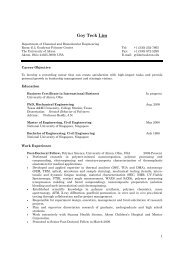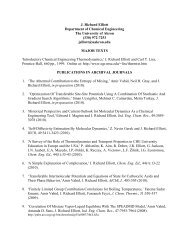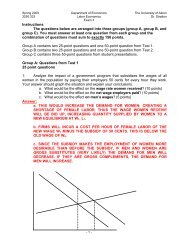Sociology of the Anarchists - Gozips.uakron.edu - The University of ...
Sociology of the Anarchists - Gozips.uakron.edu - The University of ...
Sociology of the Anarchists - Gozips.uakron.edu - The University of ...
Create successful ePaper yourself
Turn your PDF publications into a flip-book with our unique Google optimized e-Paper software.
SOCIAL MOVEMENTS<br />
When spiders unite,<br />
<strong>the</strong>y can tie down a lion.<br />
- African proverb<br />
A core component <strong>of</strong> sociology is how and why people work toge<strong>the</strong>r in groups and<br />
organizations, specifically within social movements. If collective behavior is viewed as<br />
<strong>the</strong> random and unintentional result <strong>of</strong> people interacting toge<strong>the</strong>r, social movements are<br />
<strong>the</strong> result <strong>of</strong> deliberate and intentional interactions. Even though anarchism has long been<br />
identified as a movement (although to some a dead one), it is rarely written about as such.<br />
Jeff Shantz (2003) writes:<br />
Conventional analyses <strong>of</strong> social movements continue to<br />
overlook <strong>the</strong> emergence <strong>of</strong> unconventional manifestations<br />
<strong>of</strong> resistance... Analyses have been constrained by a ra<strong>the</strong>r<br />
myopic preoccupation ei<strong>the</strong>r with organizational structures<br />
and resources which allow for access to <strong>the</strong> state or with<br />
civil actions (including civil disobedience) by which<br />
activists might register dissent or popularize claims... Left<br />
out <strong>of</strong> conventional <strong>the</strong>orizing are movements which want<br />
no part <strong>of</strong> world order, new or o<strong>the</strong>rwise, which <strong>the</strong>y view<br />
as authoritarian, hierarchical, and inevitably genocidal (or<br />
“eco-cidal”). (p. 90)<br />
Anarchism has been given a decent treatment in <strong>the</strong> field <strong>of</strong> history. But, to leave<br />
anarchism within <strong>the</strong> academy's History Departments misleads one to think that<br />
anarchism is merely a historical relic. In doing so, <strong>the</strong> vast leaps in <strong>the</strong>ory and practice<br />
that have been made by successive waves <strong>of</strong> <strong>the</strong> anarchist movement are overlooked.<br />
I think <strong>the</strong> most appropriate and useful (although perhaps not as entertaining) way in<br />
which to study anarchism is via sociology's sub-discipline <strong>of</strong> “social movement” <strong>the</strong>ory.<br />
Some <strong>of</strong> <strong>the</strong> more well-known texts on social movements have commented on anarchism.<br />
Critiques <strong>of</strong> Social Movement <strong>The</strong>orists<br />
[List texts here. <strong>The</strong>n respond to <strong>the</strong>ir handling <strong>of</strong> anarchism.]<br />
“Frontiers in Social Movement <strong>The</strong>ory”, ed. By Aldon D. Morris & Carol McClurg<br />
Mueller. No index mention.<br />
“Power in Movement: Social Movements and Contentious Politics”, Sidney Tarrow. Five<br />
total pages <strong>of</strong> reference in index. Tarrow closes one small section “<strong>The</strong> Anarchist<br />
[ Williams 41 ] [ this is a draft. do not cite. ]






